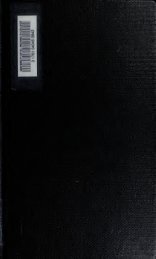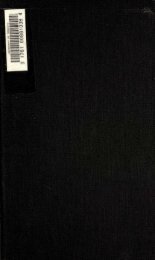Texts from the Buddhist canon : commonly known as Dhammapada
Texts from the Buddhist canon : commonly known as Dhammapada
Texts from the Buddhist canon : commonly known as Dhammapada
Create successful ePaper yourself
Turn your PDF publications into a flip-book with our unique Google optimized e-Paper software.
144<br />
DHAMMAPADA.<br />
On which <strong>the</strong> m<strong>as</strong>ter w<strong>as</strong> affrighted, and, in consultation<br />
with <strong>the</strong> king and his ministers, it w<strong>as</strong> agreed that he<br />
shovdd no more be brought into <strong>the</strong> battle-field." In con-<br />
tinuation, Buddha said : " Eahula ! if men committing <strong>the</strong><br />
niile faults only guai-d <strong>the</strong>ir tongtae <strong>as</strong> this elepliant w<strong>as</strong><br />
trained to guard his trunk, all would be well. Let <strong>the</strong>m<br />
guard against <strong>the</strong> arrow that strikes in <strong>the</strong> middle ! let<br />
<strong>the</strong>m keep <strong>the</strong>ir mouth, lest <strong>the</strong>y die, and fall into <strong>the</strong><br />
misery of future births in <strong>the</strong> three evil paths 1" And<br />
<strong>the</strong>n he added <strong>the</strong>se stanz<strong>as</strong> :<br />
—<br />
" I am like <strong>the</strong> fighting elephant, without any<br />
,<br />
fear of <strong>the</strong> middle arrow (<strong>the</strong> arrow wounding <strong>the</strong><br />
middle part). By sincerity and truth I escape <strong>the</strong><br />
unprincipled man (lawless man). Like <strong>the</strong> ele-<br />
phant, well subdued and quiet, permits <strong>the</strong> king<br />
to mount on hia trunk (offers his trunk for <strong>the</strong><br />
king to <strong>as</strong>cend), thus tamed is <strong>the</strong> reverend man,<br />
he also endures truthfully and in faith."<br />
Eahula, hearing <strong>the</strong>se words, w<strong>as</strong> filled with sorrow for<br />
his careless disregard of his words, and gave himself up to<br />
renewed exertion, and so became a Eahat.<br />
2, In days of old, when Buddha w<strong>as</strong> residing in <strong>the</strong> Jeta-<br />
vana of ^^r&v<strong>as</strong>tl, preaching his doctrine for <strong>the</strong> sake of<br />
angels and men, at this time <strong>the</strong>re w<strong>as</strong> a certain nobleman,<br />
a householder (grihapati), named Atidharma (ho-ti-<br />
wan), who, having come to th? place where Buddha w<strong>as</strong>,<br />
after <strong>the</strong> customary homage, stood on one side and said<br />
"World-honoured! whenever I undertake any religious<br />
duty, such <strong>as</strong> making an offering or o<strong>the</strong>r service, I feel<br />
har<strong>as</strong>sed and oppressed by some selfish feeling or o<strong>the</strong>r,<br />
that destroys my peace of mind. Would that of your<br />
great love you would explain this." Then <strong>the</strong> Lord bade<br />
him sit down^ and forthwith <strong>as</strong>ked him his name, and<br />
whence he came. On this, again prostrating himself, he<br />
:





